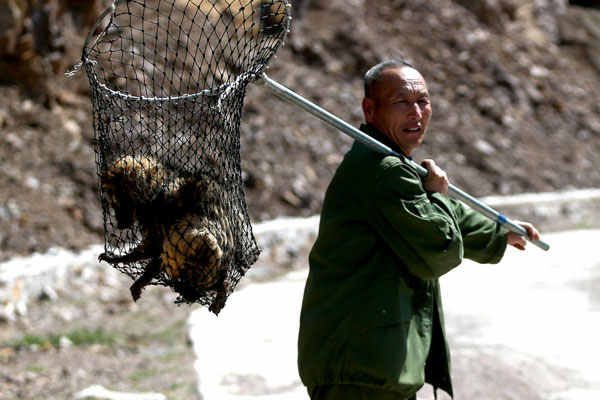'Compassion' overload poses ecosystem threat
Updated: 2016-07-11 08:48
By Su Zhou(China Daily)
|
|||||||||
 |
|
A Beijing forestry worker carries a captured arctic fox that was illegally released into the wild in Beijing in April.[Photo by Hei Ke/China Daily] |
Liu Lian believes that her years of adhering strictly to the concept of fangsheng-saving animals from being slaughtered for food and releasing them into the wild-has changed her son's destiny.
Liu, from Fuzhou, Fujian province, said her life was perfect until four years ago when she was nine weeks pregnant and was diagnosed with a serious heart condition.
More bad news was to follow. "When I was 23 weeks pregnant, the doctor told me that the baby's head was abnormal. My mother and I almost fainted when we heard the news," the 28-year-old said. "Three weeks later, the doctor changed his diagnosis and told me everything was fine. However, five months after my son was born, we noticed something was wrong; he had little response to the outside world and was unable to make any sounds."
Liu decided to share her story online in the hope that an expert would offer advice, but instead of physicians, she was contacted by a number of Buddhists.
"They suggested I read Buddhist scriptures to my son, saying that would help him. However, the scriptures are too long, so I decided against it. Later, they made another suggestion, saying I should buy animals from the market and set them free," she said.
"Buddhist teachings say every living thing can become a Buddha, and the ultimate merit is conferred on anyone who saves lives. So, that's what I have done for three years now. My son's condition has improved greatly, and he is able to form rudimentary words."
Buddhists believe in reincarnation, so they follow a range of practices-including vegetarianism, burning incense and donating money to temples-in the hope their souls will be reborn on a higher plane of existence. Many also release animals into the wild.
Bai Shui, a Buddhist from Guilin in the Guangxi Zhuang autonomous region, set animals free every week for 20 consecutive weeks. He helps organize a group that collects funds online and purchases animals solely for the purpose of setting them free.
A controversial practice
The practice may sound harmless, but it's controversial. Although Liu and Bai claim their actions are prompted by a reverence for life, the animals they release often cause extensive damage to other species and the ecosystem.
On March 27, a group of people bought and released 380 raccoon dogs and arctic foxes from trucks in the Huairou district of Beijing, according to reports by Beijing Evening News. In the days that followed, local villagers reported that their poultry had been harassed and killed as the dogs and foxes sought food.
Today's Top News
Suspect in Dallas attack wanted to 'kill white people'
5 Dallas police killed at protest against police shooting
Ministry slams US-Korean THAAD deployment
Shoring up support
UK Iraq report highly critical of Tony Blair
UK invasion of Iraq was not last resort: Report
Berlusconi accepts Chinese offer for AC Milan
UK consultancy loses license, Chinese graduates being told to leave
Hot Topics
Lunar probe , China growth forecasts, Emission rules get tougher, China seen through 'colored lens', International board,
Editor's Picks

|

|

|

|

|

|







